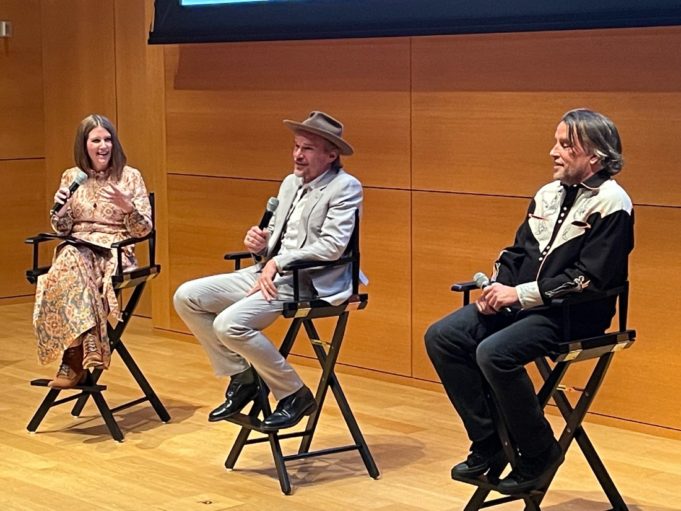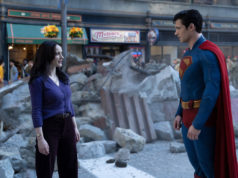Saturday, typically the busiest day of the festival, was relatively quiet this year. The highlight of Saturday was the presentation of lifetime achievement awards to Richard Linklater and Ethan Hawke. The two Oscar nominees from Texas had to join the festival remotely last year, but they were able to appear in person this year and reflect on their 25 years of collaboration on the Before movies and Boyhood. Asked about the dynamic between them, Hawke said, “I am very pretentious. Rick helps me not to be a pretentious asshole.” A lot of us could use someone like that in our lives. The gala also presented an award to Channing Godfrey Peoples, whom I profiled in these pages last year. She disclosed that Linklater had screened Miss Juneteenth before its Sundance premiere and given her notes.

Dean Peterson’s Kendra and Beth is a drama about a chronically depressed Minnesota factory worker (Kate Lyn Sheil) whose life changes mostly for the worse when she meets a Manic Pixie Dream Girl (Eleanore Pienta, whom you may remember as the female lead on the Fort Worth-filmed A Bad Idea Gone Wrong). The main reason to see this is Sheil’s terrific turn as a woman who’s about to snap under the strain of taking care of her aged mother and her starving-artist older brother while working at a sausage warehouse that’s even colder than the Minnesota weather and full of guys who harass her. The documentary John Wilcox — The Relinquishment of Time introduced me to the Fort Worth abstract artist. While I was interested by his canvases, the movie’s tone was so self-important that it came off like a parody of documentaries about artists.

Sunday’s slate started off with Clean Slate, Jared Callahan’s documentary about two drug addicts at a Christian rehab clinic in the Atlanta area who decide to make a fiction short film about rehab. Josh Litton, who has practical experience from working on TV commercials and Christian movies, does more of the planning and logistics, while Cassidy Detmer is the creative visionary who is kicked out of the clinic when he relapses but allowed to keep working on the project. The film I saw (as opposed to the film that the subjects are making) had some issues with pacing in the early parts, and I wish Callahan had concentrated more on the filmmakers’ two-day shoot, which offers up much in the way of dramatic material. Rainstorms bedevils their outdoor scenes and the filmmakers didn’t have the budget to bring the actors back for reshoots. Their film eventually screens at a festival, and it’s a mixed triumph.

I cringed when I saw that C. Bailey Werner’s The One You’re With is a film about the pandemic and prepared to experience lockdown with whiny, educated white people. The comedy wasn’t as bad as I anticipated, with a New York transplant to Austin (Koko Marshall) having a one-night stand with a tech nerd (played by Werner himself) and then having to shelter in place with him during a state of emergency. The film has some funny stuff with the TV appearances by the clownish U.S. president (Colton Dunn) who tells everyone to drink turpentine to cure the virus, and the guy’s past with a rap-rock band called C.O.B. (Children of Brokennness). The relationship subplot, on the other hand, only drags everything down. The film can’t transcend its formula.

The last film I saw was one of the best: Jockey is refreshingly free from the cliches of horse-racing movies. Clifton Collins Jr. plays an aging rider who a) starts losing control of the muscles in his right arm, b) takes charge of a fast new filly whom he describes as “the kind of horse I never thought I’d get to ride,” and c) has a young rival jockey (Moisés Arias) inform him that he’s his son. Collins is a great veteran character actor, and he holds up well in the lead role here, while first-time director Clint Bentley doesn’t gloss over the grimy side of racing and what it does to the bodies of the people who ride the horses. The film was shot at Turf Paradise in Phoenix — my neck of the woods! — and it dares not to climax with our protagonist winning the big race. I’m recommending it when it comes out this Christmas.
I’ll say it again: I’m impressed with what the Lone Star Film Festival was able to accomplish under straitened circumstances. When this accursed pandemic finally abates (get your vaccines and boosters, everyone), I’ll be glad to see our local movie fest back in full flight.












